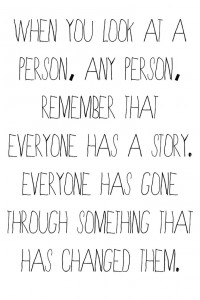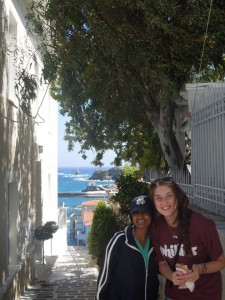by Nikita Taniparti, India
Globe-trotting is always fun and exotic. Cool blue waters on a deserted Mediterranean Island, enticingly lush forests in the Amazon, challenging yet rewarding hikes up the world’s tallest peaks in the Himalayas, or spying on Saharan elephants on a safari. Some will proclaim the eternal “travel bug” of having to go and see new sights or taste new flavors. The Eiffel Tower by moonlight, a casual stroll down the streets of Brazil, or a lively tea ceremony in Japan – sign me up! On those days you’re bored with your average lunch fare, all you can think of is Ethiopian lentils, Indian chai, or Italian Gelato. I’m as much of a foodie as the next person. But what about something else, something obvious but not much pondered over?
You know what really gets me about traveling? The people. The world begins and ends with us. Without us, there would be no us. Moving past this escalating existential trend, what I mean to say is that you can travel to unknown and striking moments just with an interaction with another person. Interning with the Fulbright Program in Washington DC has opened my eyes to the plethora of international-oriented ideas you can have right where you are. Scholars come here from everywhere, we send grantees to ever corner of every country, and all our conversations in the office involve at least two or more continents and/or languages. I grew up all over and visited the world. I’ve seen people I admire, respect, envy, and avoid – but they’re all people who make this world what it is. You never have something to lose by interacting with someone, but you always stand something to gain. So, why not? Everyone has a story (just like you), and everyone’s story has a life of its own. Someone once famously (and wisely) said, “Our lives are storybooks that we write for ourselves; wonderfully illustrated by the people we meet”. Isn’t it though? What would your life be if not for the people who have been in it? We are people, and we thrive on our lives revolving around each other.
Why am I writing about this? Because I think that we are sometimes so caught up in continuing our own story, in trying to outdo our own imagination in the revels of what might be most fabulous, that we forget that there are people all around us – just like ourselves – who have a story. People who have gone through something, anything, that has changed them and made them who they are. So go out and explore, adventure with the countless souls you encounter each day, and remember that sometimes you can travel far by not traveling at all. I’ve met people who have told me their life stories, and I’ve met people who have honked at me as I run off the street and out of their way; they’ve all inspired me to reflect on my own life in many ways – on life in general. I find it incredible that the world over, people are from so many different places, so many backgrounds, so many circumstances; but somehow, we find each other and we find out that we have something in common. We can relate to someone, we can identify with an idea (from across the world or from right next door), we can seize the moment of connection. That moment is what I crave, more than drinking piña coladas in the Caribbean, more than skiing down peaks in New Zealand, maybe even more than a hot-air balloon ride over the Pyramids. Wherever you are, wherever you go, take a moment to look around…at the people.

